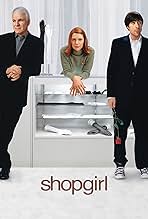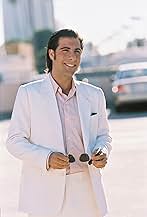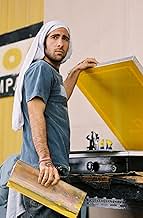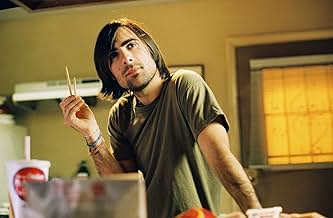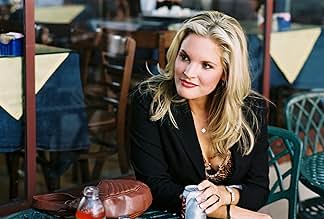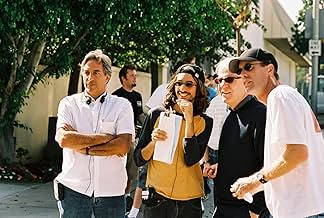AVALIAÇÃO DA IMDb
6,3/10
25 mil
SUA AVALIAÇÃO
Um complexo triângulo amoroso entre uma vendedora entediada, um homem de negócios rico e um jovem sem rumo.Um complexo triângulo amoroso entre uma vendedora entediada, um homem de negócios rico e um jovem sem rumo.Um complexo triângulo amoroso entre uma vendedora entediada, um homem de negócios rico e um jovem sem rumo.
- Prêmios
- 1 vitória e 7 indicações no total
John Fedevich
- Hot Tears Band Member
- (as Johnny Fedevich)
Avaliações em destaque
It's no real secret that through his writing, Steve Martin has depth and sentimentality that Hollywood doesn't always let him show. He has shown signs of a longing to grow old gracefully (as his almost gimmick-free gigs as Oscar host have shown) and let his acerbic wit and insight drive projects more than the over-the-top slapstick antics of the 1970s Steve Martin.
It's also no real secret that many of his recent films have been far from great.
So, still having faith in the man, and having loved the novel on which this film is based, I went in to the cinema desperately wanting to like it, but expecting to be disappointed. Largely, I was pleasantly surprised that the novel did transfer well to the screen.
Some of the credit for this belongs to director Anand Tucker, who has created some powerful images of the hustle and bustle of the LA that Martin describes in the novel, and contrasts it well with the characters who lead shallow lives, trying to be something meaningful amongst all the chaos.
Credit also goes to the actors who show that longing that drives the situation: Claire Daines as Mirabelle clearly WANTS to be social, artistic, loved; Jason Schwartzman as Jeremy WANTS to be sensitive, witty, lovable; Martin as Ray Porter clearly WANTS to be suave and considerate. Without having many jokes in the script, audiences can still appreciate the humour by seeing these pathetic struggles. When I saw it there was plenty of laughter at all the right moments.
I will, however, hasten to add that there are parts of the book that never would have translated well to the Hollywood screen, and the praise that some give the movie for serving its purpose will contain the same reasons that others wish to knock it. The book's strength is that one can feel for the characters because they are portrayed as superficial people and their lives and conversations are so shallow in comparison to the narrative that sets them up. The reasons why it works so well as a book could well be the very things that cause it to not work on the screen. Then there's the matter of a book that's so rooted in "LA sux" sentiment being made into a Hollywood movie. So maybe the musical overkill reeked of "excuse me, we're trying to tell you something". Maybe the spots of narration felt out of place and indicated that Martin is not yet over his desire to spend his life as the 'star' of his projects (him getting top billing for the movie was also a bit much, in my opinion).
Ultimately, maybe the audience members who were longing for a film with more 'depth' and 'substance' were in actuality sharing the characters' longings for the same in their own lives. Maybe the 'criticisms' are in fact backhanded compliments that the film is largely doing just what it's meant to do.
It's also no real secret that many of his recent films have been far from great.
So, still having faith in the man, and having loved the novel on which this film is based, I went in to the cinema desperately wanting to like it, but expecting to be disappointed. Largely, I was pleasantly surprised that the novel did transfer well to the screen.
Some of the credit for this belongs to director Anand Tucker, who has created some powerful images of the hustle and bustle of the LA that Martin describes in the novel, and contrasts it well with the characters who lead shallow lives, trying to be something meaningful amongst all the chaos.
Credit also goes to the actors who show that longing that drives the situation: Claire Daines as Mirabelle clearly WANTS to be social, artistic, loved; Jason Schwartzman as Jeremy WANTS to be sensitive, witty, lovable; Martin as Ray Porter clearly WANTS to be suave and considerate. Without having many jokes in the script, audiences can still appreciate the humour by seeing these pathetic struggles. When I saw it there was plenty of laughter at all the right moments.
I will, however, hasten to add that there are parts of the book that never would have translated well to the Hollywood screen, and the praise that some give the movie for serving its purpose will contain the same reasons that others wish to knock it. The book's strength is that one can feel for the characters because they are portrayed as superficial people and their lives and conversations are so shallow in comparison to the narrative that sets them up. The reasons why it works so well as a book could well be the very things that cause it to not work on the screen. Then there's the matter of a book that's so rooted in "LA sux" sentiment being made into a Hollywood movie. So maybe the musical overkill reeked of "excuse me, we're trying to tell you something". Maybe the spots of narration felt out of place and indicated that Martin is not yet over his desire to spend his life as the 'star' of his projects (him getting top billing for the movie was also a bit much, in my opinion).
Ultimately, maybe the audience members who were longing for a film with more 'depth' and 'substance' were in actuality sharing the characters' longings for the same in their own lives. Maybe the 'criticisms' are in fact backhanded compliments that the film is largely doing just what it's meant to do.
Edward Hopper was the great painter of urban loneliness. Shopgirl had two perfectly composed and lit shots that could pass for Hopper paintings -- the one where we first see Mirabelle behind the glove counter at Saks, and the one where she solves the problem of how exactly to cross the intimacy threshold with Ray for the first time. Both involve the display of exquisite merchandise to customers who have excellent taste but don't quite appreciate the full value of what's being offered.
The relationship between Ray and Mirabelle is, of course, a transaction. Ray is what used to be called a sugar daddy. He knows it, and within the limits of that role he is apparently a generous and considerate keeper. We aren't given Ray's back story, but it is not hard to guess that a symbolic logician who made a fortune in computers might have been socially challenged, to put it mildly, as a young man, and suffered a good deal of rejection from women. He can now buy what he couldn't then woo, but experience has taught him never to relinquish control and never to let himself be vulnerable. A few hundred million dollars have cleaned up his exterior nicely and given him power over his surroundings, but the inner nerd is still there.
Mirabelle certainly appreciates the value of what Ray can do for her. Consider the shot in Vermont where she gazes at her dried out, prematurely worn mother and decides she'll meet Ray in New York after all. But Mirabelle refuses to admit to herself that she is only being kept. We are meant to think the better of her for her self deception. The sluttish, annoying and frankly mercenary but cheerfully self aware Lisa is there to draw an unfavorable contrast with Mirabelle. Paradoxically, it is Mirabelle's self-deceived integrity, and her refusal to use the crude manipulations Lisa suggests, that make her a more exquisite ornament for Ray -- gourmet arm candy for a man with the finest taste. Both women are punished for self deception, but Lisa suffers only comic humiliation while Mirabelle sets herself up for real pain.
Jeremy has the makings of a Ray in him, but we are meant to believe that he has -- implausibly -- attained emotional enlightenment, if not the capacity for articulate speech or sustained rational thought. He has earned Mirabelle, we are told, because he has remade himself to be worthy of her. Love may not conquer all in this bittersweet anti-romance, but it still does better than break even.
The relationship between Ray and Mirabelle is, of course, a transaction. Ray is what used to be called a sugar daddy. He knows it, and within the limits of that role he is apparently a generous and considerate keeper. We aren't given Ray's back story, but it is not hard to guess that a symbolic logician who made a fortune in computers might have been socially challenged, to put it mildly, as a young man, and suffered a good deal of rejection from women. He can now buy what he couldn't then woo, but experience has taught him never to relinquish control and never to let himself be vulnerable. A few hundred million dollars have cleaned up his exterior nicely and given him power over his surroundings, but the inner nerd is still there.
Mirabelle certainly appreciates the value of what Ray can do for her. Consider the shot in Vermont where she gazes at her dried out, prematurely worn mother and decides she'll meet Ray in New York after all. But Mirabelle refuses to admit to herself that she is only being kept. We are meant to think the better of her for her self deception. The sluttish, annoying and frankly mercenary but cheerfully self aware Lisa is there to draw an unfavorable contrast with Mirabelle. Paradoxically, it is Mirabelle's self-deceived integrity, and her refusal to use the crude manipulations Lisa suggests, that make her a more exquisite ornament for Ray -- gourmet arm candy for a man with the finest taste. Both women are punished for self deception, but Lisa suffers only comic humiliation while Mirabelle sets herself up for real pain.
Jeremy has the makings of a Ray in him, but we are meant to believe that he has -- implausibly -- attained emotional enlightenment, if not the capacity for articulate speech or sustained rational thought. He has earned Mirabelle, we are told, because he has remade himself to be worthy of her. Love may not conquer all in this bittersweet anti-romance, but it still does better than break even.
Claire Danes has become a lanky, elegant movie star in the old Hollywood tradition and "Shopgirl" showcases it without a doubt. She was always a good actress but now she's more than that. Her character is a genuine creation that moves in logical if unpredictable patterns. Steve Martin, the most self effacing of the contemporary American comedic geniuses, is becoming quasi french in his story telling style without betraying his utter Americaness. I have a feeling that he'll continue to surprise us and I for one will wait eagerly for his next move. The thinking clown if there ever was one. Jason Schwartzman belongs to the quirky Coppola, Nicolas Cageish school of acting and he is a delight. Odd and sexy in the most irresistible way. The film has an intellectual pace and a sad smile at its center. A real original American comedy for the new millennium.
"Shopgirl", the magnificent novella by Steve Martin, finally arrives as a movie that expands on the text, as Anand Tucker, its director, demonstrates. Steve Martin also adapted his own story, which works well with the movie version since he knows what he wants to say and how to present the story in cinematic terms.
This film is about how sometimes a man, who evidently is a successful business person, can't see what he does to a woman who, in spite of the warnings, has fallen deeply in love with him. Ray Porter, is an egotistical man, incapable of expressing his emotions unless they are in the form of material things. Ray is an empty man who can buy whoever he wants to be with, but who demands there will be no strings attached to any sort of relationship.
Mirabelle, the young gloves sales lady at Los Angeles' Saks 5th Ave., is a lonely girl who has relocated to the city from Vermont. It's hard for anyone in that environment to connect with people, especially in a place like L.A. where no one talks to one another and everyone seems to be impressed with celebrities that are to be seen everywhere. Mirabelle is destined to a life of loneliness until two men appear at about the same time, the goofy Jeremy, and Ray Porter.
Jeremy likes Mirabelle in his own crazy way. Mirabelle responds to him because he means easy companionship without complications. When Ray appears on the scene, Mirabelle has no clue about what she is getting in for. Before anything, Ray makes it clear he wants no commitment, and no attachment. It's just a convenient situation for him as he has calculated that Mirabelle is perhaps a sexual diversion, at best. He finally reveals what he really has in mind when he tells the girl his intentions for the New York apartment, something that he hasn't included her in, at all.
This bittersweet story comes alive because of Claire Danes great performance as Mirabelle. Ms. Danes is perfectly cast as Mirabelle. Steve Martin's characterization as Ray Porter, is superb in his take about this man. Mr. Martin clearly understands what this man is really like and what makes him tick. Both these actors contribute to making their characters feel real.
On the other hand, the goofy performance from Jason Schartzman is distracting from the other story. The best sequence involves the beautiful Bridgette Wilson in thinking Jeremy is the real Ray Porter.
The excellent cinematography by Peter Suschitzky gives "Shopgirl" a sophisticated look that goes perfectly with the story being told. Anand Tucker directed with elegance and a sure hand making the film a winner.
This film is about how sometimes a man, who evidently is a successful business person, can't see what he does to a woman who, in spite of the warnings, has fallen deeply in love with him. Ray Porter, is an egotistical man, incapable of expressing his emotions unless they are in the form of material things. Ray is an empty man who can buy whoever he wants to be with, but who demands there will be no strings attached to any sort of relationship.
Mirabelle, the young gloves sales lady at Los Angeles' Saks 5th Ave., is a lonely girl who has relocated to the city from Vermont. It's hard for anyone in that environment to connect with people, especially in a place like L.A. where no one talks to one another and everyone seems to be impressed with celebrities that are to be seen everywhere. Mirabelle is destined to a life of loneliness until two men appear at about the same time, the goofy Jeremy, and Ray Porter.
Jeremy likes Mirabelle in his own crazy way. Mirabelle responds to him because he means easy companionship without complications. When Ray appears on the scene, Mirabelle has no clue about what she is getting in for. Before anything, Ray makes it clear he wants no commitment, and no attachment. It's just a convenient situation for him as he has calculated that Mirabelle is perhaps a sexual diversion, at best. He finally reveals what he really has in mind when he tells the girl his intentions for the New York apartment, something that he hasn't included her in, at all.
This bittersweet story comes alive because of Claire Danes great performance as Mirabelle. Ms. Danes is perfectly cast as Mirabelle. Steve Martin's characterization as Ray Porter, is superb in his take about this man. Mr. Martin clearly understands what this man is really like and what makes him tick. Both these actors contribute to making their characters feel real.
On the other hand, the goofy performance from Jason Schartzman is distracting from the other story. The best sequence involves the beautiful Bridgette Wilson in thinking Jeremy is the real Ray Porter.
The excellent cinematography by Peter Suschitzky gives "Shopgirl" a sophisticated look that goes perfectly with the story being told. Anand Tucker directed with elegance and a sure hand making the film a winner.
One of the best of this year that I have seen. Writing was top notch, acting great, and set direction and cinematography outstanding! Many of the shots were jaw droppingly "wow." A really pretty movie to look at and an emotionally torturing movie to watch for someone closer to Martin's age than the rest of the cast.
Sure, Ray is playing out a fantasy that is kind of creepy, but there are women looking for that kind of relationship, just listen to Dr. Laura. And men too, of course. Plus, the voice over sets this up as it basically says she is looking for love to "find her" and Ray does, so this is built into the premise like it or not. Over the course of the movie she matures beyond her fantasy, and I would like to think Ray does as well, although that isn't as clear.
Sure, Ray is playing out a fantasy that is kind of creepy, but there are women looking for that kind of relationship, just listen to Dr. Laura. And men too, of course. Plus, the voice over sets this up as it basically says she is looking for love to "find her" and Ray does, so this is built into the premise like it or not. Over the course of the movie she matures beyond her fantasy, and I would like to think Ray does as well, although that isn't as clear.
Você sabia?
- CuriosidadesFor the scene in Mirabelle's bedroom where the cat jumps on the bed and watches her and Jeremy, there were actually two cats used. The director explains in his commentary that one could jump but never watched, and the other was good at watching but couldn't jump.
- Erros de gravaçãoThe card that Ray sends to Mirabelle reads "I would like to have dinner with you" in block print, with a signature at the bottom. When we see this card again at the very end of the movie, the signature has been replaced by "Ray Porter" in block print.
- Citações
Ray Porter: As Ray Porter watches Mirabelle walk away he feels a loss. How is it possible, he thinks, to miss a woman whom he kept at a distance so that when she was gone he would not miss her. Only then does he realize that wanting part of her and not all of her had hurt them both and how he cannot justify his actions except that... well... it was life.
- ConexõesFeatured in Late Show with David Letterman: Episode #13.53 (2005)
- Trilhas sonorasLily & Parrots
Written and Performed by Mark Kozelek
Published by God Forbid (BMI)
Courtesy of Jetset Records
Principais escolhas
Faça login para avaliar e ver a lista de recomendações personalizadas
Detalhes
- Data de lançamento
- País de origem
- Idiomas
- Também conhecido como
- Shopgirl
- Locações de filme
- 2250 Apollo Dr., Los Angeles, Califórnia, EUA(Ray Porter's home.)
- Empresas de produção
- Consulte mais créditos da empresa na IMDbPro
Bilheteria
- Orçamento
- US$ 10.200.000 (estimativa)
- Faturamento bruto nos EUA e Canadá
- US$ 10.284.523
- Fim de semana de estreia nos EUA e Canadá
- US$ 229.685
- 23 de out. de 2005
- Faturamento bruto mundial
- US$ 11.675.161
- Tempo de duração
- 1 h 46 min(106 min)
- Cor
- Mixagem de som
- Proporção
- 2.35 : 1
Contribua para esta página
Sugerir uma alteração ou adicionar conteúdo ausente







